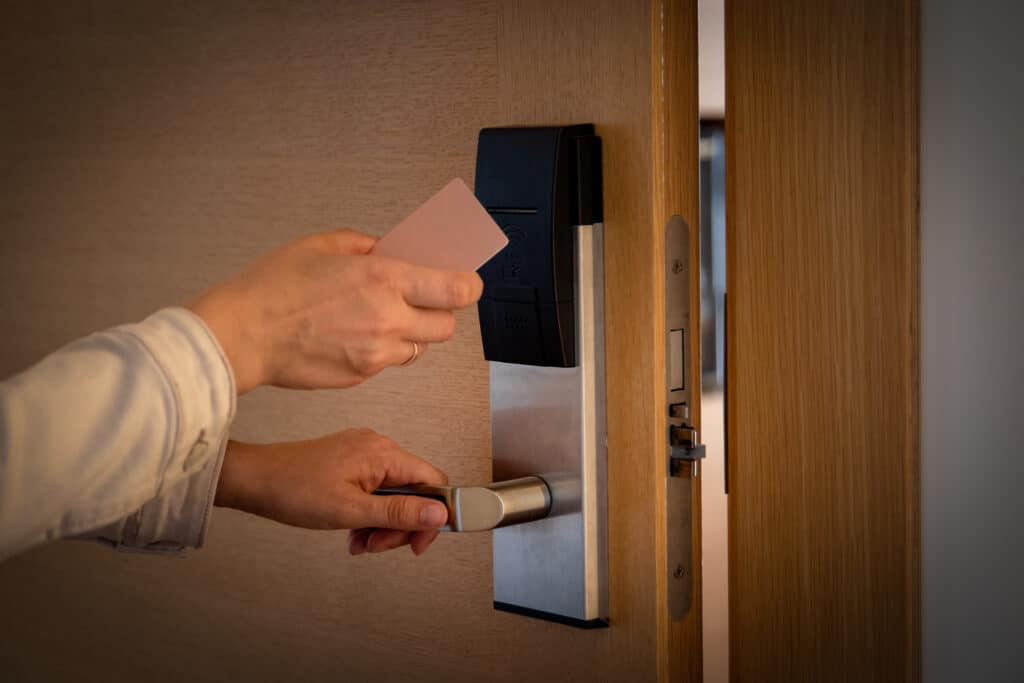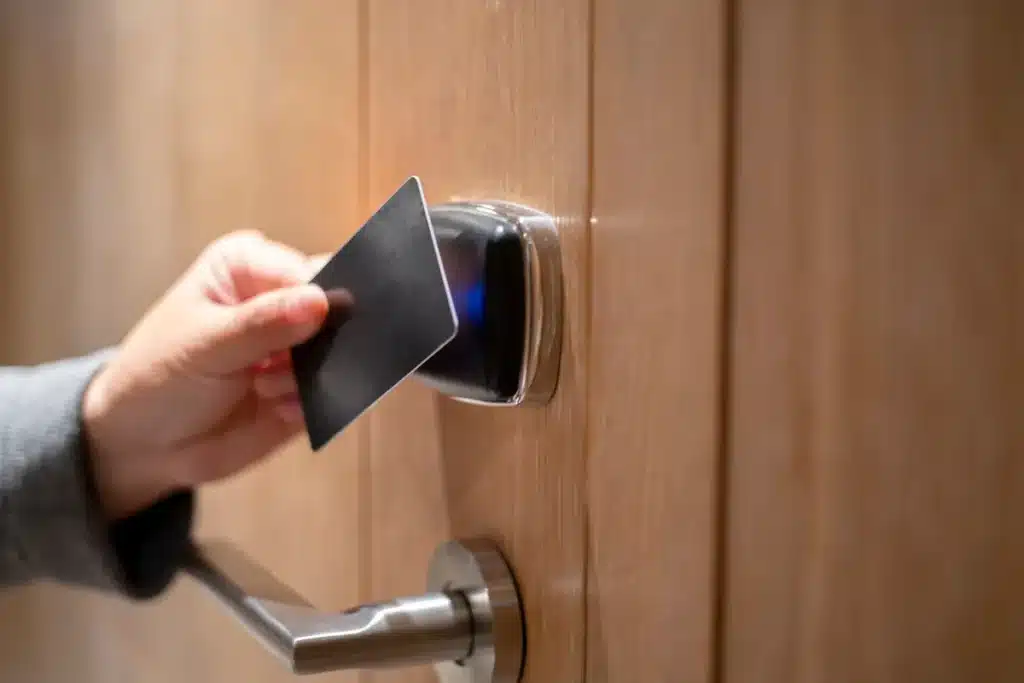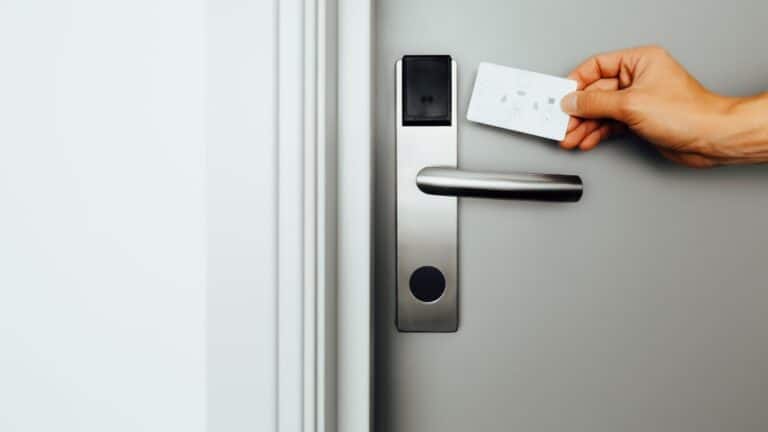Introduction
How To Secure A Hotel Room Door: The world of hotel room security, where ensuring your safety and peace of mind is paramount. Your hotel room should be a sanctuary where you can relax, unwind, and feel protected. One of the most fundamental aspects of this security is ensuring that your hotel room door is properly secured. In this guide, we will delve into the essential steps and precautions you can take to fortify your hotel room door against unauthorized access and potential intruders. Whether you’re a seasoned traveler or a first-time adventurer, understanding the tactics and tools available to enhance your hotel room door’s security will empower you to fully enjoy your stay with confidence.
Everything you need to know, from the fundamentals to the more sophisticated techniques. Is right here to make your hotel room feel more like home. In this comprehensive guide, we will unravel the layers of hotel room security, starting with the very foundation: your door. From understanding the mechanisms of different types of locks to mastering the art of using additional security devices. We will equip you with the knowledge needed to transform your hotel room into an impregnable fortress of tranquility.
Whether you’re a business traveler striving for a productive trip, a leisure seeker embracing new adventures, or a family creating cherished memories. The principles of hotel room security remain universal. Join us as we delve into practical steps and proactive measures that can make all the difference in ensuring your stay is as secure as it is enjoyable. After all, your hotel room isn’t just a temporary abode – it’s your sanctuary, and it’s time to secure it as such.

How do you secure a hotel door with a towel?
To implement the hotel towel trick, start by wedging the towel tightly between the door and the doorframe. This will create resistance and make it more difficult for someone to push the door open from the outside. Make sure the towel is positioned below the door, where the opening is most substantial.
Choose a Suitable Towel: Opt for a thick towel that can effectively block the gap beneath the door. The towel’s length should be sufficient to cover the entire width of the door.
Roll the Towel: Roll the towel tightly, ensuring it’s compact enough to fit snugly beneath the door.
Place the Towel: Position the rolled towel at the base of the door, aligning it with the gap. Push it as far as it can go to create a barrier.
Adjust as Needed: Check to see if the towel effectively blocks the gap. If not, unroll and adjust it until you achieve a secure fit.
Visual Deterrent: The sight of a towel at the base of the door can potentially deter opportunistic intruders who might assume the room is occupied.
Noise Barrier: Placing a towel can also help minimize noise from the hallway, promoting a quieter environment for relaxation.
Added Peace of Mind: If you feel uncomfortable with the door’s security measures, using a towel can provide an additional sense of control.
How do you secure things in a hotel room?
Always lock valuables away out of sight in the hotel room safe and use a secondary lock like the Milockie on the hotel safe to stop the safe door from opening. A Portable Travel Safe is something you take with you to lock up your valuables.
Begin your quest for security by selecting a reputable and well-reviewed hotel. Established hotels often invest in comprehensive security measures, including surveillance cameras, trained staff, and secure access control systems, reducing the likelihood of theft.
Most hotels provide in-room safes for storing valuable items like passports, cash, and electronics. Utilize this secure option to protect your most important belongings while you’re out exploring. Set a unique code to ensure only you have access.
When you’re not using your luggage, keep it locked with a padlock or luggage lock. This not only deters opportunistic theft but also provides an extra layer of protection for your items.
Even when using the hotel safe, keep valuable items out of plain sight. Place them in inconspicuous places within your luggage or utilize discreet pouches designed for travel security.
How do you secure a hotel door with a chair?
Jam a chair under the doorknob.
Bear in mind that this method only works if the door opens inward. Warning: If someone tries to force the door open from the outside. There is a chance that the chair will break. This is a trick, not a fail-proof security system.
Choose a Sturdy Chair: Opt for a sturdy, heavy chair that won’t easily shift or collapse under pressure. A chair with a solid backrest and legs is preferable.
Place the Chair in Position: Position the chair in front of the door, with the backrest facing the door and the seat facing the interior of the room.
Wedge Under the Doorknob: Tilt the chair slightly and use the backrest to wedge against the doorknob, preventing it from turning.
Create a Barrier: Ensure the chair is positioned in a way that makes it difficult to open the door from the outside without first moving or dislodging the chair.
Test for Stability: Push the door gently to test the stability of the chair. Adjust its position if necessary to create a secure barrier.
Visual Deterrent: The sight of a barricaded door might deter opportunistic intruders from attempting unauthorized entry.
Added Peace of Mind: If you have concerns about the door’s security features, using a chair can provide an additional sense of control.
How do I stop someone from breaking into my hotel room?
Make sure the door is locked both when you leave and when you enter a room. Burglars can often break into rooms simply because the guests forget to close the door. If you’re staying in a hotel with a deadbolt, engage it each time you leave the room. If your room has a chain lock, put it in place.
Start by selecting a reputable hotel with a proven track record of security. Research reviews, ratings, and the establishment’s security features, such as surveillance cameras, secure access systems, and well-trained staff.
Upon entering your room, immediately lock the door behind you. Utilize both the door’s regular lock and the deadbolt for an added layer of security. Ensure that the deadbolt engages fully and securely.
You might use security bars or a portable lock to secure the door to the floor or the door frame. Even if the key is in the lock, these gadgets will prevent the door from opening.
Use the in-room safe to store valuables such as passports, cash, and electronics. If the safe is not available or is too small, consider asking the front desk to store valuable items in the hotel’s main safe.
Lock windows and balcony doors when you’re not in the room. These can serve as potential entry points for unauthorized individuals.
What are hotel room locks called?
Since the RFID locks’ code cards can be easily reprogramed, they are frequently utilized in hotels. These are the advantages and disadvantages of
RFID system: Advantages. Disadvantages.
Traditional Key Locks: These are the most straightforward locks, requiring a physical key to open the door. While they offer simplicity, they also pose challenges such as the potential for lost keys or unauthorized duplication.
Card Key Locks: One of the most common types, card key locks use magnetic stripe or RFID technology. Guests receive a card that, when inserted or waved in front of a sensor, grants access to the room. These locks are practical, and their security features may be quickly disabled if necessary.
Smart Locks: Leveraging modern technology, smart locks allow guests to use smartphones or other electronic devices to unlock their rooms. Some smart locks offer features like remote access, allowing guests to unlock their room without approaching the door.
Keyless Entry: Card key locks and smart locks eliminate the need for traditional keys. Streamlining the check-in process and minimizing the risk of key-related issues.
Security Codes: Some locks provide a keypad for guests to enter a personalized security code. Enhancing security by reducing reliance on physical items like keys or cards.
Audit Trail: Many modern locks keep a record of entries and exits, offering security personnel valuable information in case of incidents or disputes.
Which security tools are used in the hotel?
Uses of Security Tools and Devices in Hotels
Video surveillance, digital key cards, and hotel panic buttons are three ways to achieve this. Conventional room keys are easily lost, literally opening the door to theft or break in. Digital credit card-type key cards, however, can activated or deactivated when necessary.
Surveillance cameras are a cornerstone of hotel security. Strategically placed cameras monitor public areas, entrances, corridors, and parking lots, deterring potential intruders and providing a record of events for investigative purposes.
Access control systems use technologies like card keys, key fobs, or biometric recognition to restrict entry to authorized personnel and guests. These systems enhance security by preventing unauthorized individuals from accessing restricted areas.
Trained security personnel, including uniformed guards and surveillance operators, play a critical role in maintaining a safe environment. They monitor camera feeds, conduct regular patrols, and respond to incidents as needed.
Hotels are equipped with fire alarms, smoke detectors, and emergency buttons that guests can use to summon help during critical situations.
What is security in a hotel?
Hotel security is the management of the safety of guests and property in hotels, lodgings and entertainment facilities. It involves procedures, systems and personnel that ensure guests are safe in their rooms and around the venue and that their property and vehicles are secure.
Guest Room Security: Hotels employ advanced locking systems, such as electronic key cards and biometric technology, to ensure that only authorized individuals can access guest rooms.
Emergency Preparedness: Hotels have plans in place to respond effectively to emergencies, whether they are fire outbreaks, natural disasters, medical incidents, or security threats. Regular drills and training ensure staff is prepared to handle such situations.
Digital Security: With the proliferation of technology, hotels also focus on protecting guest data and personal information. Secure Wi-Fi networks, encrypted connections, and secure payment systems are vital components.
Safety Measures: Safety features include fire alarms, smoke detectors, sprinkler systems, and emergency exit plans to ensure the physical well-being of guests and staff.
Do hotel rooms lock themselves?
The answer is mostly yes, but there are some exceptions. Most hotels have security measures in place to ensure the safety of their guests, including locking the doors at night. However, there are still instances when guests may find themselves locked out of their rooms.
The safety and security of hotel guests are paramount concerns, and modern hotel rooms are equipped with a range of locking mechanisms to ensure that guests can feel secure during their stay. One common question often asked is whether hotel rooms lock themselves. The answer lies in the specific locking mechanisms used by different hotels and the level of automation they employ. In this article, we’ll explore the concept of auto-locking systems in hotel rooms and how they contribute to guest security.
Auto-locking systems in hotel rooms are designed to automatically lock the door after it’s closed. This means that guests don’t need to manually insert a key or engage a lock to secure the room; instead. The door will lock itself after a certain period of time, typically a few seconds to a minute. The idea behind auto-locking systems is to ensure that the room remains locked whenever a guest leaves or enters, reducing the risk of unauthorized access.
The exact functioning of auto-locking systems can vary depending on the technology used by the hotel. Some common mechanisms include:
Card Key Systems: In hotels with card key systems, guests receive a card that serves as both a room key and a means to activate the auto-locking mechanism. When the guest inserts the card into the designated slot or waves it in front of a sensor, the door unlocks. When the guest leaves and closes the door, the system will automatically engage the lock after a brief period.

Conclusion
Whether you’re on a solo expedition, a romantic getaway, or a family retreat, the steps you take to secure your hotel room door reflect your commitment to your own well-being. As you settle into your temporary haven, take a moment to reinforce your defenses – after all, a secure door isn’t just a barrier; it’s a symbol of your empowerment and control over your surroundings.
Whether you’re a business traveler striving for a productive trip, a leisure seeker embracing new adventures, or a family creating cherished memories, the principles of hotel door room security remain universal. Join us as we delve into practical steps and proactive measures that can make all the difference in ensuring your stay is as secure as it is enjoyable. After all, your hotel room isn’t just a temporary abode – it’s your sanctuary, and it’s time to secure it as such.
As you settle into your chosen accommodations, may the knowledge you’ve acquired serve as a shield, allowing you to relish the excitement of exploration without compromising your safety. Your hotel room isn’t just a physical space; it’s a sanctuary, a temporary home. By securing its entrance, you’re securing your connection to a world of opportunities and experiences.

